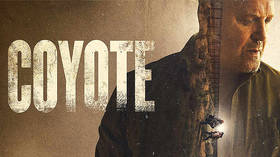‘Coyote’: The ‘New Breaking Bad’ is Homeland Security propaganda

The new CBS series ‘Coyote’ has been promoted as a replacement for the hugely popular drama ‘Breaking Bad’, with all the familiar dramatic hallmarks. But under the glossy veneer lies a carefully controlled narrative.
The series premiered earlier this month via CBS’ All Access streaming service. Star Michael Chiklis compared ‘Coyote’ to ‘Breaking Bad’ and to his own action-suspense cop show, ‘The Shield’.
In an interview, Chiklis explained: “What’s thrilling about this is there’s crossover for sure, people who are fans of ‘The Shield’ will be fans of this show and fans of ‘Breaking Bad’ will be, too, because my old dear friend Michelle MacLaren, who shot more episodes of that show than anybody, is my executive producer partner in this.”
MacLaren, a director and producer on the new show, has previously helmed both ‘Breaking Bad’ and its spin-off ‘Better Call Saul’ as executive producer, and the slow-burning plot, sandy vistas and psychotic Mexicans in ‘Coyote’ will be familiar to fans of both series. The core plot – of a bald, middle-aged American man who has lived his life on the right side of the law only to get drawn into the criminal underworld – is a similar setup to MacLaren’s best-known work.
Likewise, Chiklis’ performance as Ben Clemens, a retired border patrol officer who gets embroiled with a Mexican drug cartel, feels like a reworking of Walter White in some moments, though perhaps not often enough to generate the obsessive fanbase that Bryan Cranston inspired.
Homeland Security enter stage right
What has been overlooked in these frequently made comparisons is that just as ‘Breaking Bad’ was supported by the Drug Enforcement Agency, ‘Coyote’ benefited from production assistance from the US government. This included help from Customs and Border Protection and Homeland Security Investigations, two divisions of the Department of Homeland Security.
A dossier of documents obtained via FOIA requests to the DHS Office of Multimedia, Motion Pictures and Television reveal that they had input on the series as early as February 2015, when ‘Coyote’ was being developed for AMC, the channel that brought ‘Breaking Bad’ to the world. The project was slated to begin filming in 2016, but the DHS documents show that it remained in development for several years before being picked up for a full season production.
In exchange for providing technical advice, access to government facilities for filming and CBP uniforms to help add authenticity, the DHS had a major influence on the scripts for the show. ‘Coyote’ was initially going to focus on a DEA protagonist but the DHS’ Hollywood office persuaded the producers to change this to Customs and Border Protection and Homeland Security Investigations, both of whom feature heavily in the show.
As the DHS reports record, the central government agency in the story “originally was going to be DEA but convinced the change over to HSI.” This fundamental shift turned ‘Coyote’ from an advert for the DEA into a piece of propaganda for Homeland Security.
While Clemens engages in criminal acts, he only does so due to the cartel threatening him and his family, while every other government employee character is a cleaner-than-clean image of professionalism and dedication to law enforcement. After our protagonist kills two cartel hitmen in self-defence, he is pursued by a HSI officer investigating his post-retirement activities, resulting in a dramatic showdown between the pair at the series climax.
Also on rt.com ‘One Night in Miami’ isn’t a commentary on current racial strife… instead it illustrates how far America has actually come on raceThe consultants behind the scenes
However, ‘Coyote’ offers a more textured view of the problems around the US’ southern border than a simple tale of heroic government officials. As Clemens gets deeper into the world of drug traffickers and gangsters, many of his assumptions about immigration are challenged. He learns that many of the people illegally entering the US are fleeing the violence and economic depravity caused by the criminal cartels.
This is likely the result of the input of several technical consultants who are credited on the show, including the Mexican journalist Leon Krauze, and former Border Patrol agent turned immigration rights activist Jenn Budd. Budd in particular has been a vocal critic of US immigration policy, and the culture of “sexual assault, corruption and moral failure” that she witnessed and experienced while working on the border.
Despite offering this more complex and sympathetic view, ‘Coyote’ ultimately portrays the militarisation of the border as a necessary response to the threat posed by criminal Mexicans. Grisly murders committed by soulless cartel operatives pepper the show, including one especially gruesome scene where two ICE officers are decapitated with a bridge cable.
The violence of the US security state, which has seen deaths in immigration detention reach record levels, is entirely absent from ‘Coyote’. Naturally, there are no scenes of immigrants being hosed down with industrial chemicals, or being forced to have hysterectomies.
While the series acknowledges that some immigrants to the US are trying to escape legitimate dangers, these are framed solely in terms of the threat posed by Mexican cartels. ‘Coyote’ entirely overlooks the grim reality that US foreign policy triggers crises and often drives mass migrations to America and elsewhere.
These kinds of significant absences from an otherwise grounded and realistic drama are one of the hallmarks of US government support. Underlining the close cooperation between the DHS and the ‘Coyote’ producers, another credited consultant on the series was Janice Ayala, a high ranking Homeland Security official.
Ayala’s profile on the DHS website states she is the “Director of Joint Task Force – Investigations (JTF-I).” The outline of JFT-I could almost be a description of the portrait of the US security state on ‘Coyote’, with the website calling it “a DHS effort that prioritizes and integrates support for criminal investigations along the US ‘Southern Border and Approaches’ to mitigate the risk of terrorism, dismantle transnational criminal organizations and prevent their reconstitution, and reduce illicit flows.”
Also on rt.com ‘Promising Young Woman’ is a #MeToo revenge fantasy that is galling for its unashamed hatred of men, but glorious for its artistry‘Very pro-law enforcement’
The result of these consultants’ input is an intricate drama that acknowledges the complexities and problems of immigration through the southern US border, while also promoting the expansion of the US security state in response.
Chiklis tried to defend this apparent contradiction in the show’s approach to the issues it depicts, saying, “You are for something or you are against it... And that’s ridiculous, in my opinion. Two things can be true at once. You can be pro-law enforcement, very pro-law enforcement in fact, but also recognize that there’s systemic racism and there’re things that need to be done to rectify that problem.”
However, ‘Coyote’ does little to explore systemic racism, or any of the alleged or proven scandals within the US security agencies engaged on the border. Instead, the producers chose to foreground an image of Central Americans as the originators of violence, and avoided any notion of corruption or collusion between the cartels and US government agents. The underlying message is that everyone – whether US citizens or otherwise – should accept the 100-mile-wide ‘constitution-free zones’ on America’s borders, because otherwise it won’t just be Michael Chiklis whose life is taken over by dastardly Latin criminals.
Think your friends would be interested? Share this story!
The statements, views and opinions expressed in this column are solely those of the author and do not necessarily represent those of RT.













